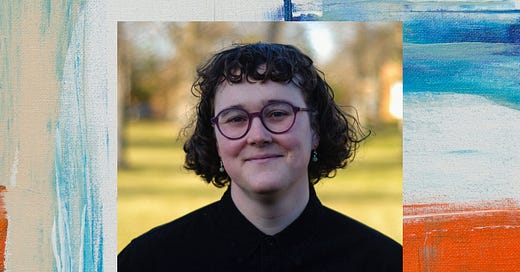In celebration of women’s history month this March, the Center for Barth Studies is highlighting some of the incredible women who contribute to this online magazine. We hope you enjoy these posts and the chance to get to know a bit more about some of our writers.
Today, we are featuring contributor Maxine King who is an enthusiastic lay person and cantor in the Episcopal Church. She is currently a student of theology at Virginia Theological Seminary.
Where do you currently study, and what is your main research focus?
I'm in the last semester of my master's degree at Virginia Theological Seminary, finishing up a thesis that thinks with Barth on theologies of revelation and sexual difference.
What compelled you to write for the Barth Center's God Here and Now online magazine?
Well, for one: I love reading and thinking with our dear friend Karl and I love how the Barth Center is creating communal space to think with Barth in generative and critical ways. But more than that, I was excited to be encouraged to engage with theological ideas in an intellectual space that was explicitly oriented to events and discourses in public consciousness (which is of course not always the case in theological study!).
Why have you chosen to write on the topics you've engaged thus far? Why are they important to you?
My most recent piece and the one I'm currently working on had their origins in conversations with friends about a piece of art or a current event we witnessed that touched on theological ideas. God Here and Now has been a perfect space for further developing these ideas while remaining close to their conversational beginning. Each were important to me, because they touched on two modern crises I am irrevocably committed to opposing (colonialism and trans antagonism) and each have been at least partially generated within Christianity and are often reproduced by Christianity. And as someone who also remains irrevocably committed to Christianity, to ignore these crises and their theological implications would be to ignore the task of theology itself.
What book has made the most impression on you in the last year, theology or beyond?
I finally read Casey Plett's Little Fish this year, and I loved it. The novel is about a few months in the life of Wendy, a trans woman who receives some strange information at her grandmother's funeral that leads her to wonder if her deceased grandfather might have been trans himself. The novel contains some lovely reflections on trans and Mennonite communities and identity as Wendy moves through her life while connecting with someone from her grandfather's past. I couldn't recommend it more.
What is one thing you wish more theologians cared about today?
I'm tempted to flip the question and give one of the many things I wish theologians cared less about! But to answer the actual question: I might wish that theologians cared a bit more about the necessity of having a politics (myself very much included). Critiques of the turn to practice (such as Lauren Winner's The Dangers of Christian Practice) or of preoccupations with method (such as Hanna Reichel's After Method) have hopefully done much to dissuade theologians from thinking that we can merely tinker with our practices or methods (or even our theologies?) then sit back and watch our desired political outcomes get lived out. If practice and method can't save us from the necessity of having a politics; well, let's have a politics! My ecclesial home (the Episcopal Church) loves to yell lex orandi, lex credendi at each other in our endless liturgical debates as if our next additions to our baptismal vows will end the climate crisis. Let's instead live in the freedom of making political decisions and actions.
If you could have dinner with anyone in the world—either living or not—who would it be and why?
Origen of Alexandria—just so I could read to him what Peter Brown wrote of his sexual renunciation in The Body and Society (one of my favorite bits of academic prose ever) to see if he feels accurately represented.
You can read Maxine’s contributions to this online magazine here and here.
God Here and Now is an online magazine and newsletter from the Center for Barth Studies. If you would like to support our work, you can donate to the center here. All donations are tax-deductible. Questions? Ideas? Email us: barth.center@ptsem.edu






